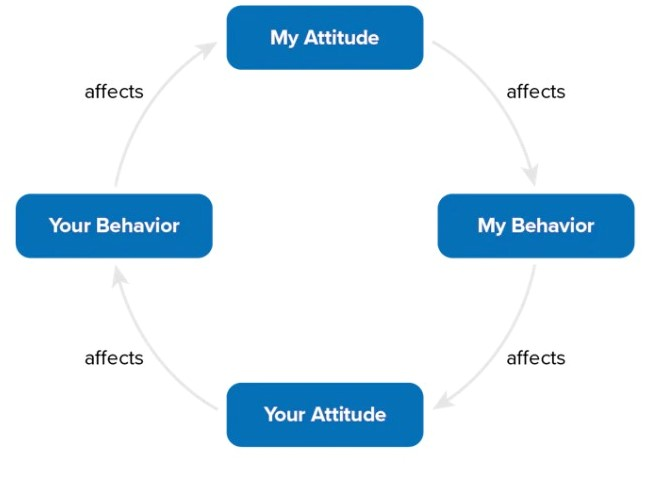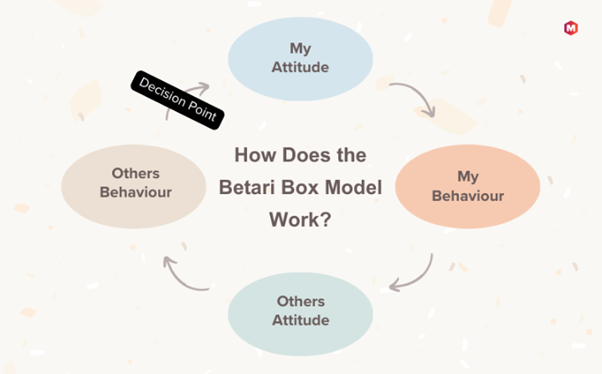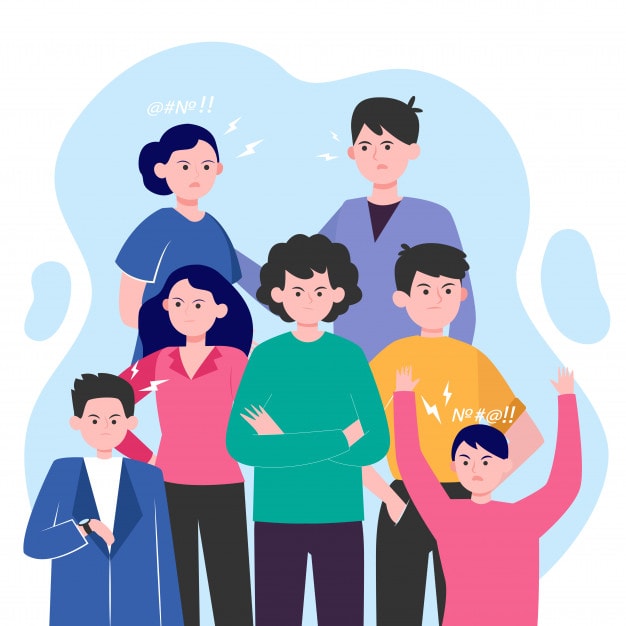Definition: The Betari Box is a model used to analyze attitudes and behaviors contributing to or resulting from conflict. It states that our attitudes can influence our behavior, which in turn can impact the attitudes and behaviors of others. This creates a cycle of conflict that can be difficult to break.
The other names of Betari Box are Betaris Box, Betari’s Box, and the Cycle of Conflict.
It shows how people are affected by how you respond to them. It suggests that altering your behavior or attitude will change people’s behavior towards you since your behavior also changes. It discusses the relationship between attitude and behavior; negative thoughts can lead to negative behavior, while positive thoughts can lead to positive responses and behaviors.
By understanding the Betari Box Model, we can gain insight into how our attitudes and behaviors are related. We can also learn how to break the cycle of conflict by changing our attitudes and behaviors. Change starts with us, so we can make a big difference by proactively making small changes in our attitudes and behavior.
Table of Contents
What Are Attitude and Behaviour?
The Betari Box framework uses words like “attitude” and “behavior” to demonstrate our influence on others and, conversely, their influence on ourselves. However, we must establish solid knowledge of these key terms before entering the framework.
What is ‘Attitude?’
Our “attitude” is a mental state or psyche that controls how we respond to people and situations around us. You may have heard the word “attitude” describe good and bad attitudes. Breaking down the word “attitude,” we can conclude how we might respond to someone or something. Most of these conclusions come from our mind, which means we might not even be aware of how we are reacting—it is an unconscious process.
What is ‘Behaviour?’
“Behavior” refers to the outward signs we show through our actions, like body language and other nonverbal communication. When we show these behaviors, others use them to form ideas and opinions about us, affecting how they react to us.
What is a Betari Box?
The Betari Box is a circular model that shows how our attitudes and behaviors are linked and influence others’ attitudes and behaviors.
The Betari Box model explains how attitudes and behavior can create a conflict cycle. It shows that if someone has a positive attitude, it can be contagious and lead to a positive mood. However, if someone has a negative attitude, it can lead to a negative mood.
This can be seen in how we display our body language. If someone is upbeat, others will often feel the same way. Conversely, others will likely display the same negative behavior and body language if someone is negative and hostile.
How Does the Betari Box Model Work?
This Betari Box concept primarily works on the idea that everyone can select a particular attitude toward different people.
For example, you may be positive, dominating, or happy toward some people and negative or positive towards others. These behaviors show that you unconsciously select an attitude when you see a person or interact with him.
On the other hand, this model suggests that we can do this consciously by selecting what attitude we want to display to each person — for example, tuning our brain to stay positive and talk nicely when interacting with our annoying colleagues.
The model strongly believes that one’s attitude affects one’s behavior, which in turn affects one’s attitude, and the cycle continues. This model is also known as the cycle of conflict.
Mood affects our frame of mind and plays a vital role in our behavior toward others. For example, when we feel very negative, we behave similarly toward the people around us.
We can be angry, impatient, or display any other negative traits that will demotivate other people. The model suggests that people should recognize these behaviors and change their attitudes, which will change their behavior.
How Does Our Attitude Affect Our Behaviors?
Our attitude directly affects our behavior. If we are in a positive frame of mind, our interactions will be more pleasant and thus have a positive effect on the people around us. On the other hand, if our attitude is negative, then our behaviors will also be harmful.
Therefore, we must understand that our attitude can shape how others perceive us and how people respond when interacting with us. Our positive attitude and behavior will influence others to respond positively.
The Betari Box model suggests that we can consciously choose our attitude and behavior towards real communication with others, which helps us maintain an appropriate level of communication in difficult circumstances.
How Does Our Behaviour Affect Others’ Attitudes?
Our behavior reflects our attitude and can either positively or negatively affect the attitudes of others. Hence, our behaviors directly affect the attitudes of others. If we often display positive behaviors, then this will positively impact others. Similarly, if we tend to act negatively, this, too, will begin to shape how others perceive us. Hence, our behavior will be mirrored in others’ attitudes toward us.
For instance, practicing empathy and understanding often leads to a better connection with others. In addition, if we make an effort to engage in meaningful conversations and treat people with respect, this can lead to a more positive attitude toward us.
Controlling Our Attitude
How do we put the needed framework into place? How can we keep reminding ourselves that we want a hopeful view? The answer is to train a decision-making habit deliberately. Excellence comes from habits that make you alert. When we do something repeatedly, our desire to do it gets stronger.
This method is called “cognitive activation” in forceful communication. Being forceful could be very helpful in this situation.
We already know how to make this easier. These strategies, which you may have thought were unimportant at one point, are key to brain recalibration:
- Deeply breathe in.
- Number pause until five. Do a subtle physical cue, like pinching your thumb and fingers together.
- Repeat a phrase in your mind.
When we choose to do one of these things on purpose, we are consciously acting. This deliberate memory shows a change toward more deliberate and analytical thinking.
Betari Box Examples
The Betari Box is a model depicting human interactions’ cyclical nature. It explains how our attitudes affect our conduct, which in turn influences the attitudes and behaviors of others. The betari box model helps us stress the feedback loop between ‘My Attitude’ and ‘My Behaviour’ and how it influences ‘Your Attitude’ and ‘Your Behavior’.
Here are some real-world examples of how the Betari Box concept might be applied:
1. Customer Service Interaction
Situation: A customer service representative (CSR) has dealt with angry customers all day and has developed a negative attitude.
Betari Box Cycle:
- My Attitude: CSR feels irritated and exhausted.
- My Behaviour: CSR is short and less empathetic with a new customer.
- Your Attitude: The customer feels neglected and becomes defensive.
- Your Behaviour: The customer raises their voice and is rude.
- (Feedback to My Attitude): CSR’s negative feelings are reinforced, leading to a continued poor attitude.
2. Workplace Collaboration
Situation: A team member is consistently positive and proactive in meetings.
Betari Box Cycle:
- My Attitude: The team member is enthusiastic and believes in the value of the project.
- My Behaviour: They actively contribute ideas and offer help.
- Your Attitude: Colleagues feel inspired and appreciated.
- Your Behaviour: Colleagues are likelier to cooperate and bring their best efforts.
- (Feedback to My Attitude): The positive group dynamics reinforce the team member’s positive attitude.
3. Family Dynamics
Situation: A parent returns home from work stressed and shouts at their child.
Betari Box Cycle:
- My Attitude: The parent is stressed and in a bad mood.
- My Behaviour: The parent is short-tempered and yells for a small mistake.
- Your Attitude: The child feels hurt and unloved.
- Your Behaviour: The child becomes withdrawn or acts out negatively.
- (Feedback to My Attitude): The parent may feel guilty or justified, depending on their reflection on the situation, which could further affect interactions.
4. Classroom Environment
Situation: A teacher consistently gives positive feedback and encouragement to students.
Betari Box Cycle:
- My Attitude: The teacher believes in the potential of every student.
- My Behaviour: The teacher is supportive and acknowledges students’ efforts.
- Your Attitude: Students feel capable and motivated.
- Your Behaviour: Students participate more and try harder in class.
- (Feedback to My Attitude): The teacher’s belief in their students is reinforced by their positive progress.
5. Road Rage
Situation: A driver starts honking and making aggressive gestures after being cut off in traffic.
Betari Box Cycle:
- My Attitude: The driver is angry and believes the other driver is reckless.
- My Behaviour: Begins honking, tailgating, and possibly yelling.
- Your Attitude: The other driver becomes defensive and angry.
- Your Behaviour: The other driver may respond with similar aggressive driving behavior.
- (Feedback to My Attitude): The situation escalates, and both drivers’ negative attitudes are reinforced.
These examples show how the loop can turn good or bad depending on how views affect how people act toward each other. Awareness of this cycle can help people and groups have better relationships and results. To break a negative cycle, you often have to change your attitude or action to stop the feedback loop.
How to Break the Cycle of Conflict
We need to be aware of the link between attitude and external behaviors to break the cycle of conflict. Let’s go through the steps that can help you break the conflict cycle:
1. You must understand that your attitude will be reflected in you as it affects others. How you behave with other people is how they will end up feeling. For example, if you are hurt, you automatically try to hurt somebody, which is terrible. The negativity spreads like a plague from one person to another. On the other hand, if you are happy, it spreads similarly from one person to another.
2. The critical thing is being aware of what you are feeling. The conscious thought process stops when feelings take control of your actions. It is imperative not to let feelings take control of your behavior. If you know your emotions are improving, you should consciously decide to intervene. Before making an emotional outburst, the best way is to stop for a minute, think about what you will do, and analyze if it will make things right.
If it is merely venting out, you should not let your emotions get the better of you. Many regret not thinking for a moment before taking steps or actions that could have changed their lives. A simple smile can often break a Negative cycle or a hate cycle.
3. Whenever someone says something negative to you, you can either respond to him in his way or kindly. Some people will have a bad day, which may not be your fault. But since you are present in front of that person, there is a very high chance that the entire venom of negativity spills on you.
Before you react, understand that the person may be going through a tough time. While it may not be reasonable to smile whenever someone slaps you, it sometimes makes a difference.
4. Some people have bad days, and there are outbursts of negativity. Others are consistently in negative ways. If a person is purposefully negative or spreading hatred, then it is time for you to stop being kind or responding in a good way and try to analyze what is bothering him.
Replying positively to an adverse reaction is okay initially, and sometimes, but if one person is consistently negative to your positive replies, then you should intervene. Ask the person why his negativity is and, if possible, help him solve it.
5. It is highly recommended that you work on your emotional intelligence to improve your behavior with others. If you’re healthy emotionally, you can control your emotions consciously, and impulsive behavior will not be a part of you. Emotional well-being is different from physical well-being, and a person should practice controlling extreme negative or positive outbursts.
Conclusion!
Thus, the Betari box theory suggests that moods influence our behavior, but our behavior can be dictated if we control our emotional reactions.
It is a good thing to do, especially in a workplace where frequent emotional responses may not be welcomed.
Liked this post? Check out the complete series on Marketing


